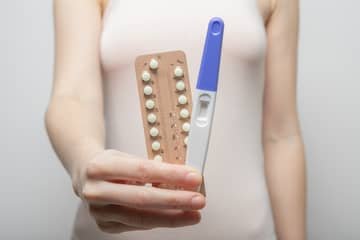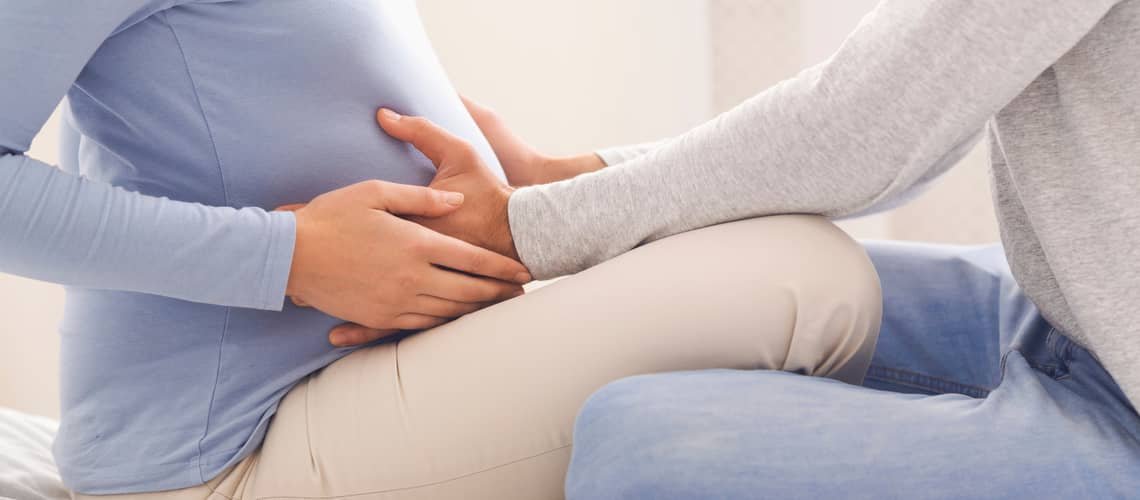
Baby's first movements. Where and when do you feel the first movements in your belly?
Many mothers-to-be cannot wait for the moment when they perceive and feel that a new life is growing inside them. The first movements of the baby in the belly are therefore not only surprising, but also joyful. The moment a woman feels the baby's first movements or kicks, it will be clear that the ultrasound was not lying and that there is a real little person in her belly who is looking forward to the world. How to recognize the baby's movements? When to feel the first movements in the abdomen? What do rapid movements of the baby in the tummy mean? You will find the answer to everything important in this article.
The first movements of a baby are always a significant moment for parents. Since each pregnancy has its own specifics, it is important to remember that this moment can be perceived differently by a first-time mother and a second -time mother, respectively. mother of many. The first weak movements in pregnancy take place already around the seventh-eighth week. In the ninth week, the baby begins to move its arms and legs, and around the eleventh week it moves its head. However, these movements of the baby can only be seen during an ultrasound examination. The fetus is still too weak for the pregnant woman to notice its movements at this stage of pregnancy.
When to feel the first movements of the baby?
The first significant movements in the abdomen appear around the 20th-22nd week of pregnancy. It is not precisely determined that this particular period should be a turning point. The mother-to-be can feel the movements calmly later and it does not have to mean anything bad at all. Regular visits to the gynecologist are important, as thanks to ultrasound, he can monitor the development of the fetus and its movements. Gradually, the movements become more intense, because the fetus grows, and the pregnant woman can feel even smaller movements to an increased degree. However, the nature of the movements is changing. First-time mothers sometimes have trouble distinguishing the baby's movements from the peristalsis of the intestines, the activity of which is particularly vigorous in the first trimester.
Second-time moms who have already gone through pregnancy know very well what they can expect from the baby's movements in the belly. They are able to easily distinguish the baby's movements from bowel movements. At the same time, they perceive the given movement more sensitively and can notice these movements much earlier than first-time mothers, for whom the first weak movements in pregnancy can be confusing and difficult to identify. So they can easily feel the first movements around the 16th week. Even thin women with a low body weight can notice the first movements of the baby. Women who have gone through pregnancy describe the baby's first movements in different ways. Some compare them to caressing, knocking, bubbling flapping wings, butterflies in the stomach, waves or crunching. Over time, the movements escalate and become more intense, and in the following weeks it can be safely called the baby's kicking.
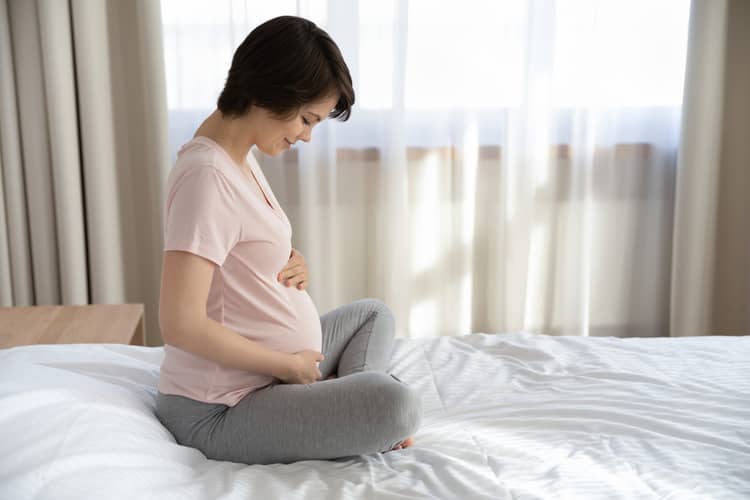
I can't feel the baby's movements. Is something wrong?
It is important to remember that even the baby in the belly has its own routine and it is good to follow it. If you already notice the baby's movements, note the intensity, time or count the number of movements. Even in the tummy, the baby has its own daily rhythm, sometimes it is active and rolls over, kicks and vice versa, sometimes it rests and sleeps. It is perfectly fine if the child sometimes has more active days and, conversely, days when he "communicates" less. Attention should be paid if the change in movements is very radical.
There can be several reasons why you suddenly feel fewer movements or they are less intense. Sometimes it can be the position of the baby, which is still moving in the amniotic fluid. The placenta can also get on the abdominal wall and the baby's movements are therefore suppressed. However, the complete disappearance of movements for a long time should not be underestimated and it is recommended to visit a gynecologist immediately. Violent or panicky movements of the fetus can also be a signal for complications. The baby may have a problem because of the inappropriate position in which he got or he does not have enough oxygen. Also, if you still do not notice the first movements from the 20th to the 24th week, be sure to visit your doctor. An ultrasound examination will be the best way to diagnose what "problem" or condition it is.
What to do if the baby does not move?
First of all, it is important not to panic right away, because it may be a phase of calm when the baby is sleeping. Know that the baby can sleep in the tummy for up to 20 hours and is simply less active in some stages of pregnancy. As mentioned above, it should be noted that if the change in movements is very radical, the child does not move for a long time. In such a case, it is ideal to visit a gynecologist immediately. However, there are certain tips that can help the baby move in the tummy. Use them if you are not sure if the baby is okay.
- Limit movement, take a quiet position. The baby will not move around in the tummy and the resting position can wake the baby up.
- Drink cold water.
- Lie down on your left side and slightly bend your right leg, in this position it is possible to observe any movements well.
- Turn up the music.
- Communicate with the baby, talk to him and include the voice of the future father. Such stimuli can trigger activity in the baby.
- Treat yourself to a sweet drink, juice or a few pieces of sweet fruit, because sugar stimulates the baby in the belly to be more active.
- Stroke and stimulate the abdomen with gentle pressure.

Tracking the baby's movements and their frequency
It is not possible to determine the appropriate frequency of the baby's movements in the tummy by a norm. Much depends on the baby, because each one is different. Movements also depend on the stage of pregnancy. It is completely normal that the fetus is sometimes more active and sometimes has a state of rest. Also, the fetus in the mother reacts to various stimuli, be it sounds, movements of the mother, the position in which the mother sits or lies. Its activity can also be affected by the amount of nutrients it receives. If the baby moves less often, this may not automatically indicate a problem. Especially in the first trimester, it is completely normal that on one day a woman feels significant activity of the baby and on the next day the frequency is minimal.
It is common that if the mother is calm and resting, the baby is active. If the mother-to-be moves more during the day, the baby falls asleep and calms down by oscillating in the amniotic fluid, which is why the baby's movements are often very intense at night. Phases of activity and rest can alternate every 20 to 40 minutes. It is interesting that the activity of the baby in the belly can also be stimulated by the intake of sweets - the sugar content in the mother's body. You can encourage the baby's activity by resting on the left side.
The woman herself perceives the baby's movements best, it is good to count all the baby's movements from the third trimester. It is good to set a certain time when you will monitor the child's activity, as he also has his own daily routine. Take the mentioned position on the left side and bend the right leg. Generally speaking, there are at least ten movements within two hours. This is also how you know that the baby in the belly is fine. However, it is not an exact measure. If you are concerned about the baby's movements, it is good to inform your doctor and possibly go for an ultrasound.
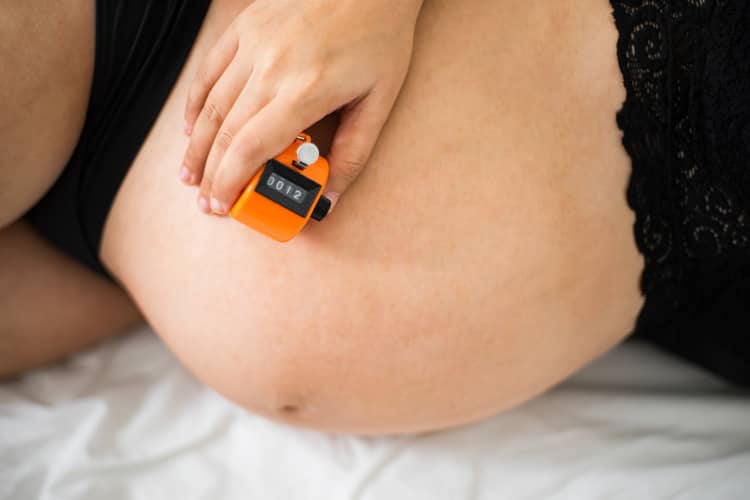
How to recognize the baby's movements?
The first movements of the baby are very slight and only the pregnant woman perceives them. Despite the fact that you can already see how the baby moves on the ultrasound around the 2nd-3rd month, it does not yet have enough strength to feel its movements. It is therefore not an exception that mothers often confuse the baby's movements with digestive activity. And where can you feel the baby's first movements? Most often on the front side of the abdomen or side walls.
Around the 5th-7th month of pregnancy, the baby's movements are the most intense, the fetus is already bigger and stronger. However, it is very individual. The baby is still small and has enough space around him to perform various acrobatic stunts or change positions. Feeling the baby's movements is very exciting for most women, and it is appropriate to share this joy with the future father or friends.
The nature of movement changes even in the later stages of pregnancy. The movements of the fetus during pregnancy - the 3rd trimester from the 28th week onwards change significantly also because the volume of amniotic fluid decreases and more space is filled by the baby itself. It does not mean that the movements must necessarily be more frequent and more pronounced. Such a change in movements is gradual, and the fact that a bigger child kicks less does not mean that something should be wrong. If he already moves or kicks, you will feel it more. Around the 8th month, the baby gets used to turning its head down, which only confirms that its arrival in the world is near. The fact that the movements before childbirth are not of such high intensity is not a cause for concern. However, regular visits to the gynecologist are in order.
Women who have already been pregnant or are mothers of multiples notice the differences between the baby's movements more intensely, because they know exactly what to expect. Compare your experiences with other moms, but don't let yourself be pressured or stressed about why something that happened to other moms isn't happening for you. The activity of the fetus and the nature of the movements are very individual. However, based on experience, the baby's movements are most intense at night. During the day, the mother's walking affects the child as a wobble and therefore the activity is lower.
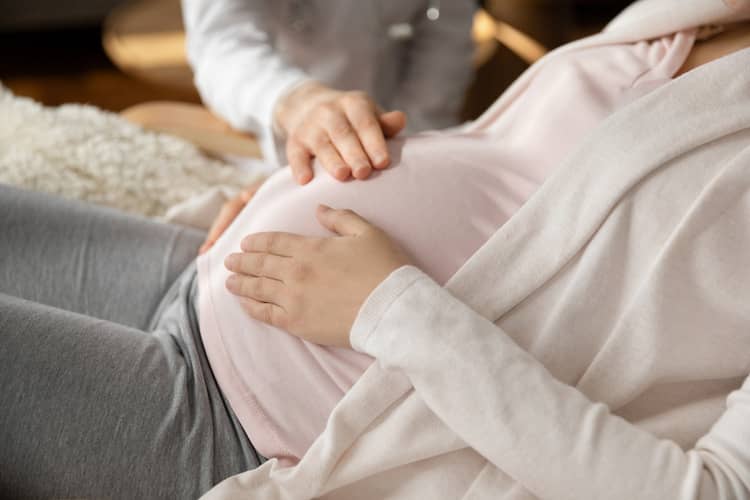
What do the baby's painful movements mean?
A very active baby in the belly can sometimes cause a lot of discomfort to the mother. Every woman can perceive the baby's painful movements differently, it also depends on the pain threshold. It is natural that some baby kicks in the abdomen or towards the ribs can cause pain. The fetus is already bigger and stronger. Even when turning the baby upside down around the 8th month, the kicks towards the lungs can sometimes be quite noticeable, despite the fact that the mother can perceive the intensity of the movements less. The expectant mother should recognize when it is clearly pain caused by the baby's movements and when it is, for example, false contractions or possible pain in the lower abdomen. If you are not sure, ask your doctor.
Experiences
The first movements of the baby are joyful moments for the expectant mother, during which she can perceive how a new life is growing in her. According to discussions, mothers feel their first movements from 16-17. tt., sometimes the baby starts moving later, only at 19.-20- tt. According to the experience of pregnant women, the first movements are manifested as gentle tapping from inside the abdomen, or as bubbles that break through to the surface.
The most frequent questions - FAQ
Are you currently pregnant and interested in what to expect from the baby's first movements? Are you looking for information on when to feel the first movements in your belly? We will be happy if you write to us how you feel about the baby's movements in the belly. Have you already given birth? We will also be pleased if you describe your own experiences regarding the baby's movements in the tummy. You can give advice and tips related to this topic to other moms or expectant mothers. Let us know in the discussion below the article.
When to feel the first movements in pregnancy?
Can I feel movements at 13 weeks?
When to feel the first movements in the second pregnancy?
Can a baby be pregnant in the belly?
Pridať komentár


